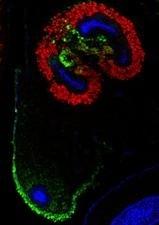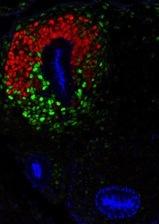

Despite advances in our understanding of the ultrastructure of eukaryotic cells, the question of how these cells coordinate to form the tissues of our bodies is still poorly understood. Once formed, we know even less about how these tissues are maintained.
The Carroll Lab is interested in how groups of cells organize themselves into properly sized, polarized tubules and then maintain these structures throughout their life. This is particularly significant as defects in these processes contribute to several human diseases.
We have been studying these events primarily using the mouse kidney as a model system. We have found that Wnt signaling is necessary for both the initial formation of the kidney tubules and for their later maintenance. In a failure of organization, mice with a null allele for Wnt9b completely fail to form kidneys. In a failure of maintenance, mice with a partial loss of function allele of Wnt9b develop polycystic kidney disease (PKD), one of the most common inherited human diseases that is characterized by defects in epithelial polarity and drastically increased cell proliferation.
We are now investigating the cellular and molecular mechanisms behind these defects for a greater understanding of the formation and maintenance of this essential organ, as well as the pathology of PKD and other related diseases such as cancer.
We are currently utilizing mouse genetics (including the engineering of transgenics and genetically ablated mice), organ culture, cell culture/biology, RNA interference, gene microarrays, in situ hybridization and immunohistochemistry to reveal the factors involved in these processes and how these factors influence cell biology within the context of the whole organ. Ultimately, we hope our discoveries will be important not only in a biological sense, but will also prove relevant to tissue engineering and the diagnosis and treatment of disease.